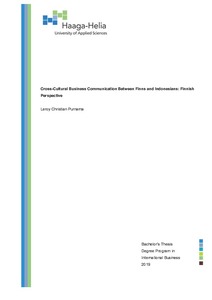Cross-Cultural Business Communication Between Finns and Indonesians: Finnish Perspective
Purnama, Leroy Christian (2019)
Purnama, Leroy Christian
2019
All rights reserved. This publication is copyrighted. You may download, display and print it for Your own personal use. Commercial use is prohibited.
Julkaisun pysyvä osoite on
https://urn.fi/URN:NBN:fi:amk-2019052812648
https://urn.fi/URN:NBN:fi:amk-2019052812648
Tiivistelmä
As cooperation between Finnish and Indonesian businesses is increasing, effective cross-cultural business communication between two countries is needed to foster cooperation. The aim of this research is to find out the ways for Finns to communicate effectively in cross-cultural business-to-business (B2B) context with Indonesians. To answer this question, cultural differences and communication behaviors between the two countries are first identified. Then, challenges faced by Finns are mapped and at the end, recommendations are presented to overcome the challenges.
The theoretical frameworks used in the research are related to cross-cultural and communication studies. Some of the relevant theories such as Hofstede’s cultural dimensions, Hall’s time and context, verbal and non-verbal communication and electronic communication are used heavily to analyze and organize the findings.
Combination of qualitative interviews and literature reviews were the chosen approach to gather primary data. Six interviews were conducted from five interviewees. Interviewees were chosen based on their experience in cross-cultural communication in business-to-business context between Finns and Indonesians. Data from the interviews were analyzed individually and cross-analysis were conducted based on theoretical frameworks to identify challenges from the Finnish perspective. Based on the challenges, the recommendation was presented based on analysis from interviews and theoretical background.
The thesis found that there are significant differences in Finnish and Indonesian culture and communication behaviors. From the differences, six areas are found to be challenges for the Finns are identified and discussed in the thesis. Finns are encouraged to maintain harmony, focus on relationship building, be more flexible & patience, sensitive to gesture, active in con-firming, avoid being to direct, ask politely when it is not clear and think about context.
The theoretical frameworks used in the research are related to cross-cultural and communication studies. Some of the relevant theories such as Hofstede’s cultural dimensions, Hall’s time and context, verbal and non-verbal communication and electronic communication are used heavily to analyze and organize the findings.
Combination of qualitative interviews and literature reviews were the chosen approach to gather primary data. Six interviews were conducted from five interviewees. Interviewees were chosen based on their experience in cross-cultural communication in business-to-business context between Finns and Indonesians. Data from the interviews were analyzed individually and cross-analysis were conducted based on theoretical frameworks to identify challenges from the Finnish perspective. Based on the challenges, the recommendation was presented based on analysis from interviews and theoretical background.
The thesis found that there are significant differences in Finnish and Indonesian culture and communication behaviors. From the differences, six areas are found to be challenges for the Finns are identified and discussed in the thesis. Finns are encouraged to maintain harmony, focus on relationship building, be more flexible & patience, sensitive to gesture, active in con-firming, avoid being to direct, ask politely when it is not clear and think about context.
